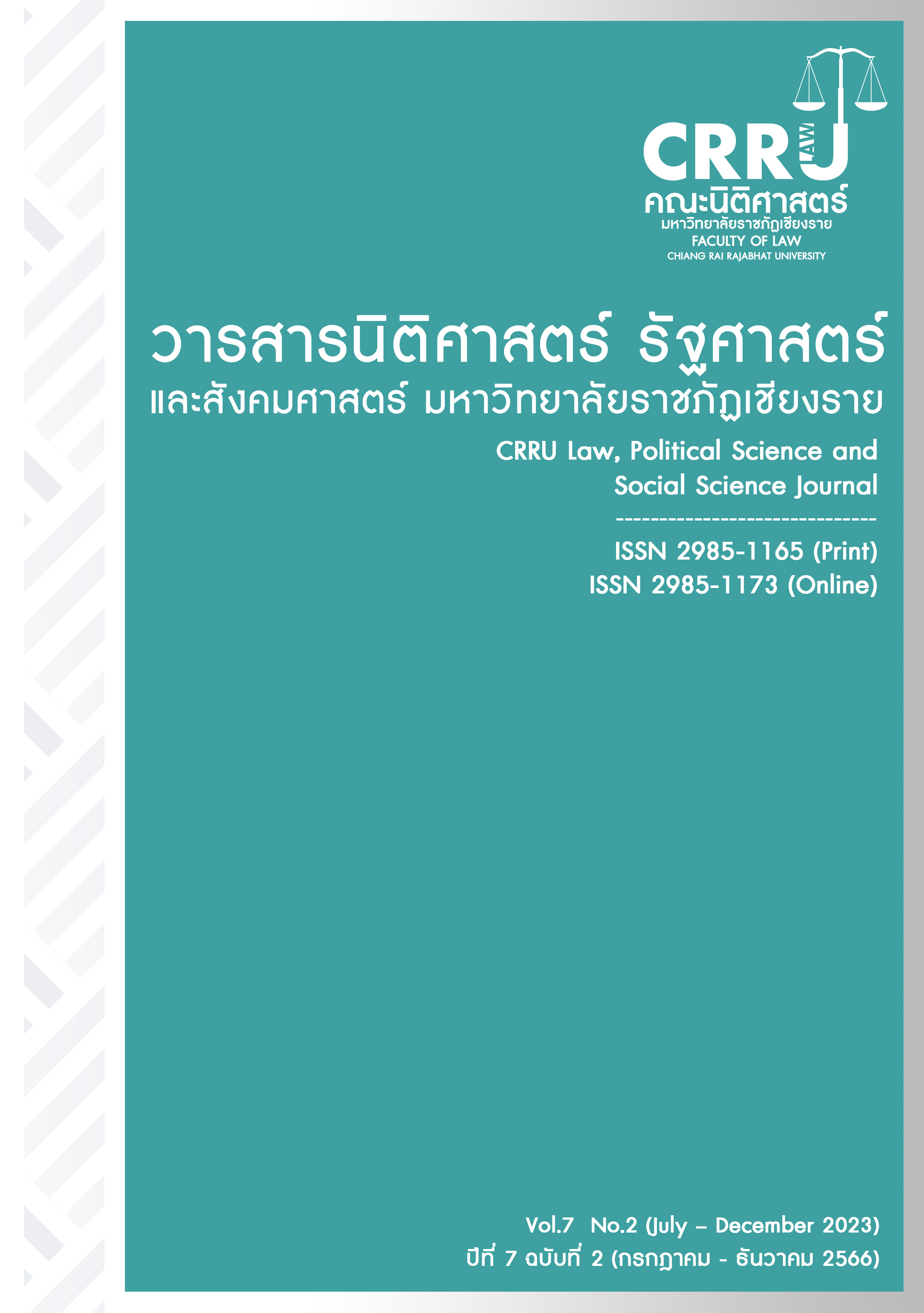The hidden empowerment of Hmong women: nonagricultural occupation groups.
Main Article Content
Abstract
This research was qualitative research to build grounded theory, purposed to explanation of transitional process occupation of Hmong women to nonagricultural occupation outside and hidden empowerment to find conclusion of grounded theory.14 selection of Hmong women as theoretical meaning contributor tracing from marital status or widow had nonagricultural occupation outside Hmong community, Houihan village, Wiengkean district, Chiangrai province. Research instrument was interviewed forms, information analysis used 3 steps were open coding, axial coding and selection coding to build theory conclusion.
The result could build conclusion of grounded theory as follows: 1.Transition process to nonagricultural occupation of Hmong women starting from 1) decreasing of highland agricultural areas from state policy and problem of agricultural products price 2) education opportunity 3) perception of social media information and 4) doing business with relative in foreign countries,2. nonagricultural occupation of Hmong women had stability and certain income and Hmong women still provide balance between occupation and did housework following Hmong’s frame, 3.empowerment of Hmong women had origin from entered to public space, perception information of women’s right and changed position to the main earning for the family, want to participate, life control and manage resource within family 4.power of Hmong women was hidden empowerment in twilight zone from patriarchy and may not be equal as man empowerment.
Article Details
References
กนกพร ดีบุรี. “เครือข่ายทางสังคมของผู้หญิงในระบบเหมาช่วง : กรณีศึกษา การผลิตเสื้อผ้าสำเร็จรูปในอำเภอสันกำแพง จังหวัดเชียงใหม่.” วิทยานิพนธ์ ปริญญามหาบัณฑิต มหาวิทยาลัยเชียงใหม่, 2542 ในสำนักหอสมุดมหาวิทยาลัยเชียงใหม่. http://cmuir.cmu.ac.th/handle/6653943832/35392. สืบค้นเมื่อ 19พฤษภาคม 2565.
กรองทอง สุดประเสริฐ. “ผู้หญิงม้งค้าผ้าใยกัญชง : จากหมู่บ้านสู่เศรษฐกิจบนบาทวิถี.” วารสารสังคมศาสตร์ มหาวิทยาลัยเชียงใหม่ 21, ฉ.2 (2552): 13-15. https://So04.tci-thaijo.org/index.php/jss/article/view/173595/124362. สืบค้นเมื่อ 3 มิถุนายน 2565.
ธงชัย ศรีเมือง. “สถานภาพภายหลังการแต่งงานของสตรีเฝ่าม้ง กรณีศึกษาบ้านทับเบิก ตำบลวังบาล อำเภอหล่มเก่า จังหวัดเพชรบูรณ์.” วิทยานิพนธ์ปริญญามหาบัณฑิต มหาวิทยาลัยมหิดล, 2545. ในศูนย์ข้อมูลการวิจัยdigitalสำนักงานการวิจัยแห่งชาติ. ttps://dric.nrct.go.th/Search/ShowFulltext/1/119450. สืบค้นเมื่อ 2 สิงหาคม 2565.
ธัญญา สังขพันธานนท์. แว่นวรรณคดี ทฤษฎีร่วมสมัย. กรุงเทพฯ: เอดิสันเพรส, 2559.
พัฒนา เศรษฐวัชราวานิช และคณะ. “การเสริมสร้างพลังอำนาจในผู้ป่วยเรื้อรังในชุมชนเพื่อป้องกันโรคหลอดเลือดสมอง.” วารสารพยาบาลสภากาชาดไทย 13, ฉ.2 (2563): 8691. https://he02.tcithaijo.org/index.php/trcnj/issue/view/17249. สืบค้นเมื่อ 1 กันยายน 2565.
วสันต์ ทองไทย. การวิจัยเชิงคุณภาพทางการศึกษา. กรุงเทพ:มหาวิทยาลัยเกษตรศาสตร์, 2554.
อดิศร ภู่สาระ. “ทุนทางสังคมกับการจัดการเครือข่ายคนชายขอบ : เครือข่ายรักษ์ป่าและสิ่งแวดล้อมดอยยาว-ดอยผาหม่นภูชี้ฟ้า.” วารสารมทร.อีสานฉบับมนุษยศาสตร์และสังคมศาสตร์ 9, ฉ.1 (2565). https://index.php /RMUTI_SS/article/view/255226/1748043. สืบค้นเมื่อ 25 สิงหาคม 2565.
เอื้อมพร ทิพย์เดช, สนม ครุฑเมือง และเปรมวิทย์ วิวัฒนเศรษฐ. “มายาคติในนิทานพื้นบ้านล้านนา.” พิฆเนศวร์สาร 14, ฉ.1 (2561): 85-101. https://so01.tci-thaijo.org/index.php/pikanasan/article/view/131551. สืบค้นเมื่อ 25 พฤษภาคม 2565.
Anzadue Gioria. Boderlands/La Frontera : The new Mestiza. SanFrancisco : Spinsters/ AuntLue, 1987. อ้างถึงใน จักกริช สังขมณี. “พรมแดนศึกษาและมานุษยวิทยาชายแดน : การเปิดพื้นที่สร้างเขตแดนและการข้ามพรมแดนของความรู้.” วารสารสังคมศาสตร์ มหาวิทยาลัยเชียงใหม่ 20, ฉ.2 (2551): 209-257. https://so04.tcithaijo.org/index.php/jss/article/view/173595/124362. สืบค้นเมื่อ 12 กรกฎาคม 2565.
Etim, S.E. “The Utilization of Social Media Platforms for viability of Femail-Owned Small and Medium-scale Enterprises in South Eastern Nigeria.” Acta Univarsitatis Danubius. Economica 16 (February 29, 2020) อ้างถึงใน เบญจา ไกรทอง. “อิทธิพลของการใช้สื่อสังคมออนไลน์ต่อการสร้างพลังอำนาจของผู้หญิง.” วารสาร มทร.อีสานฉบับมนุษยศาสตร์และสังคมศาสตร์ 9, ฉ.1 (2565): 64-77. https://so05.tcithaijo.org/index.php/RMUTI_SS/article/view/256749/174808. สืบค้นเมื่อ 5 กรกฎาคม 2565.
Foucault Michle. Discipline and Punish. London: Penguin Books, 1977, History of Sexuality : An Introduction. London: Penguin Books, 1984. อ้างอิงใน สมศักดิ์ สามัคคีธรรม, การสถาปนาอำนาจของผู้ไร้อำนาจ. กรุงเทพฯ: มาฉลองคุณซีเอสบี, 2554.
Miller David. Social Justice. Oxford: Claredon Press, 1979 อ้างถึงใน กุลภา วจนสาระ. มองหาความเป็นธรรมในสังคมไทยผ่านคนชายขอบ. บรรณาธิการ โดย กุลภา วจนสาระ และกฤติยา อาชวนิชกุล, กรุงเทพฯ: โรงพิมพ์เดือนตุลา, 2555.


